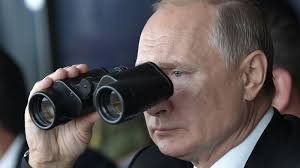The war in Gaza had served as a helpful diversion for Russia, drawing the focus away from its conflict in Ukraine. However, with a ceasefire in place between Israel and Hamas and peace talks underway, attention now shifts back to Ukraine. President Trump has announced plans to meet with Russian President Putin in Budapest, Hungary, with the aim of resolving the war between Russia and Ukraine.
Trump expressed optimism following a call with Putin, where the Russian leader reportedly praised Trump's role in achieving peace in the Middle East. The upcoming meeting between Trump and Putin presents an opportunity to discuss strategies for ending the ongoing conflict in Ukraine. This will mark the second face-to-face encounter between the leaders during Trump's second term.
The White House has hinted at the possibility of supplying Ukraine with long-range Tomahawk missiles, a move that could escalate tensions with Russia. Trump's meeting with Ukrainian President Zelenskyy will likely address this issue, as well as broader military support for Kyiv. Defense Secretary Pete Hegseth has signaled that additional firepower could be on the way for Ukraine.
Russia has expressed concern over the prospect of Ukraine acquiring advanced missiles capable of precise strikes from long distances. The Kremlin views such a move as a serious escalation that could threaten its military and industrial sites. Trump's administration is determined to push for a resolution to the conflict in Ukraine, especially as it nears its fourth year.
The recent ceasefire agreement between Israel and Hamas has raised hopes for progress in resolving the Russia-Ukraine conflict. Victoria Coates, a former national security advisor, believes that the positive momentum from the Middle East peace deal could influence efforts to end the war in Ukraine. Coordinating with other countries to pressure Putin to engage in peace talks could be a critical step in advancing negotiations.
While Russia has signaled a willingness to participate in peace talks, doubts linger over its commitment to ending the conflict. Critics, including Ukraine, accuse Russia of employing delay tactics to prolong the war and expand its territorial gains. The Kremlin maintains that Ukrainian intransigence is a key obstacle to resolving the conflict, echoing a narrative disputed by Kyiv and Western allies.
President Trump's tougher stance towards Russia marks a shift from previous engagements with Putin. By considering the supply of Tomahawk missiles to Ukraine, Trump aims to increase pressure on Moscow and challenge Putin's resolve. This approach could signal a turning point in efforts to bring an end to the war in Ukraine, as Trump demonstrates a willingness to confront Russia more assertively.
As the diplomatic push intensifies, all eyes are on the upcoming meeting between Trump and Putin in Hungary. The discussions will likely touch on critical issues such as military aid to Ukraine and avenues for achieving a lasting peace agreement. The outcome of these talks could set the stage for a new phase in the Russia-Ukraine conflict, with potential implications for regional stability and global security.

